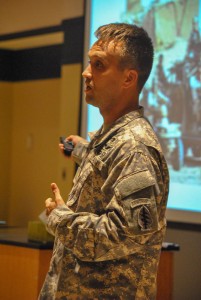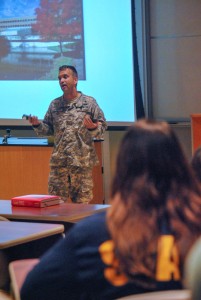
Arnett lectures to students in Jones Hall’s large auditorium about combat medicine and his career.
Michael Arnett, an army major and doctor, was invited Tuesday by Murray State’s American Medical Student Association Pre-Medical Chapter to come speak to students on the topic of combat medicine and about his life.
Arnett is currently an active -duty physician for the military stationed at Fort Campbell as well as a graduate of Murray State. He became attracted to military medicine after attending the Uniformed Services University of the Health Services for medical school were he was exposed to a number of different facets of military medicine.
As an elective, Arnett studied the effects of cold weather at the Marine Corp Mountain Warfare Training Center in the Sierra Nevada mountain range.
“When you think of combat and military medicine you think about bullets and shrapnel hitting people,” he said. “And that’s one part of it. But while one bullet will take out one person, temperatures of minus 10 degrees will take out an entire formation.”
Arnett also regaled those in attendance, mostly pre-medical majors, with the important advances in medicine the military has been responsible for, namely malaria.

Arnett shared historic images during his presentation.
He said the military became especially interested in the treatment of malaria after World War II where United States soldiers suffered heavy casualties from the disease fighting in the Pacific.
“In the Pacific Campaign half a million service men had malaria,” Arnett said. “60,000 people died as a result. That’s Utah Beach on D-Day every day for a month. But malaria doesn’t make great movies so most people don’t know that.”
Arnett said by studying the water and soldiers who had contracted malaria in Cuba, Walter Reed, a military physician, was able to figure out that the disease was being contracted and transferred by mosquito bites.
After his presentation, which included a slideshow showcasing a number of the exotic locations he had been able to travel to and work at due to his profession, Arnett answered questions about his career choice and about what students could expect pursuing a degree in Medicine and a career in the military.
Story by Ben Manhanke, Assistant News Editor
Amazing career considering the limitations of his paternal DNA…
Don't we all have that problem?